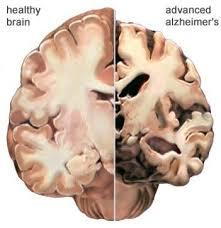
ALZHEIMER’S – TYPE 3 DIABETES

According to an article from the National Institutes of Health (NIH) Alzheimer's Disease Is Type 3 Diabetes. Brain insulin resistance, oxidative stress, and cognitive impairment are signs of Alzheimer’s Disease that include, “extensive disturbances in brain insulin and insulin-like growth factor (IGF) and could account for the majority of lesions in Alzheimer’s Disease.”
Did you know that dementia and Alzheimer’s/Type 3 Diabetes can start decades before symptoms manifest? No one likes to think that they are deteriorating, especially their brain. So, how do you know how fast your brain is degenerating if you don’t have any current symptoms?
I have seen firsthand what devastation these diseases bring to patients and their families. Not only is it difficult to deal with a possible out of pocket cost of over $60,000 per year for full time care, but the emotional and physical demands it puts on the care givers are extreme. I remember a patient telling me that he was visiting his brother and his wife had a bowel movement on the brother’s living room floor during the night. The husband woke up early that morning and cleaned up his wife’s mess but with complete embarrassment told his brother that the dog made the mess, not his wife.
Alzheimer’s has grown to epidemic proportions with over 5 million people in the United States having Alzheimer’s, which is a form of dementia. There are seven stages of Alzheimer’s from not having any symptoms at stage 1 to very severe cognitive decline at stage 7. If you have problems with completing tasks, misplacing items, forgetting words, have changes in mood, and foggy thinking then you absolutely do not want to wait for you to get worse. When you notice these things, and your brain simply is not as sharp as it used to be, it may cross your mind that you may be getting dementia or Alzheimer’s.
This is when you want to reach out and seek help. There are ways to determine if you have a predisposition for Alzheimer’s/Type 3 Diabetes. With genetic testing, the APO E4 gene is recommended to be tested. If you have one of the genes for APOE4 then your risk are 2-3 times greater, if you have both genes for the APOE4 your risk are 12 times greater. If you have the APOE2 gene then your 40% less likely to express Alzheimer’s. The APOE4 gene seems to interfere with the brain cells’ ability to use insulin, which may eventually cause the cells to starve and die. Some studies show that if insulin is the problem then you may be 10-15 times more likely to develop Alzheimer’s.
In Alzheimer’s MRI studies, the brain has shown to shrink about 17%, especially in type III diabetes. Studies have shown several factors contributing to Alzheimer’s including inflammation, oxidative stress (free radicals), mitochondrial dysfunction (energy loss), excitotoxicity (toxins), loss of sex hormones (hormone loss) and infections. Any of these factors can produce nerve tissue in the brain that gets tangled which does not work as well. “We conclude that the term “type 3 diabetes” accurately reflects the fact that Alzheimer’s represents a form of diabetes that selectively involves the brain and has molecular and biochemical features that overlap with both type 1 diabetes mellitus and type 2 diabetes mellitus.”
So, what you need to know is that diet, lifestyle and nutritional supplements give you the best chance of helping prevent yourself from getting Alzheimer’s/Type 3 Diabetes. As each person is unique so should their nutritional supplements and diet be customized for their specific needs.
If you know anyone with any of these risk factors or you want to be checked yourself, we invite you in for a consultation to see what risk factors you have and options to help.
